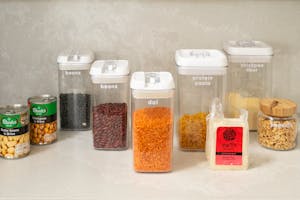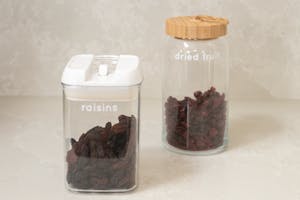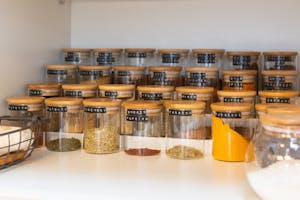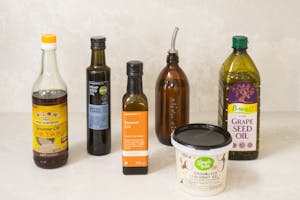A well-stocked vegan pantry is essential for efficient meal preparation and ensures that you always have the ingredients needed to whip up delicious plant-based meals. This post is all about stocking your vegan pantry with essential ingredients that will support your plant-based diet.

Whether you’re new to veganism or a seasoned pro, having a diverse array of staples at your disposal can inspire creativity in the kitchen and make sticking to a plant-based lifestyle easier.
Table of Contents
Time To Stock The Vegan Pantry (Full Ingredient List!)
cursive = stored in the fridge
bold = stored in the freezer
Legumes and Legume Products

Legumes are a cornerstone of the vegan diet, providing essential protein and amino acids. They are affordable, versatile, and can be incorporated into countless dishes. From hearty stews to protein-packed salads, legumes are indispensable.
- Dried or canned beans: Options include kidney, navy, pinto, black, lima, adzuki, mung, and black gram. These can be used in soups, stews, salads, and even desserts.
- Dried broad beans: A great snack when roasted or can be added to soups.
- Dried or canned lentils: Red and green lentils are perfect for soups, stews, and salads.
- Fresh or frozen peas: Garden peas are excellent in soups, stews, and as a side dish.
- Dried or canned chickpeas: Perfect for making hummus, curries, and salads.
- Dried or canned black-eyed beans / cowpeas: Great in soups, stews, and salads.
- Dried soybeans: Essential for making homemade tofu or soy milk.
- Edamame: Young soybeans that are great as a snack or in salads.
- Soy mince (textured vegetable protein): A versatile meat substitute.
- Tempeh: A fermented soybean product that is excellent for stir-fries and sandwiches.
- Seitan: A wheat gluten product that is a popular meat substitute.
- Tofu: Versatile and available in various textures, perfect for stir-fries, soups, and desserts.
- Vegan meat substitutes made of soybeans: These include burgers, sausages, and more.
- Legume flour: Options include chickpea flour, red lentil flour, and lupin bean flour, great for baking and cooking.
- Legume pasta: Chickpea pasta and red lentil pasta are excellent gluten-free options.
- Protein powder: Pea protein powder and soy protein powder can be added to smoothies and baking.
- Peanuts and peanut butter: Great for snacks, cooking, and baking.
- Hummus: A delicious spread or dip made from chickpeas.
Grains and Grain Products

Grains are a vital part of the vegan diet, providing fiber, vitamins, and minerals. They can be used in a variety of meals, from breakfast to dinner.
- Rice: Basmati, jasmine, and brown rice are staples for many dishes.
- Wild rice: Adds a nutty flavor and chewy texture to dishes.
- Oats: Steel-cut, rolled, and instant oats are perfect for breakfast and baking.
- Pearl barley: Great in soups and stews.
- Amaranth: A nutritious grain that can be used in porridge and baking.
- Millet: A versatile grain that can be used in salads, porridge, and baking.
- Quinoa: Technically a seed, but used like a grain. It’s great in salads, as a side dish, or for breakfast.
- Popcorn kernels: A healthy snack when air-popped.
- Grain flour: Includes wheat, barley, rye, spelt, rice, buckwheat, and teff flours, essential for baking.
- Corn starch, potato starch*, tapioca flour* or arrowroot flour* for thickening: Used for thickening sauces and soups.
- Pasta: A quick and easy meal base.
- Cereal: Choose whole grain options for a healthy breakfast.
- Bread: Choose whole grain options for a healthy breakfast.
- Tortillas: Great for wraps and tacos.
*Tip: Potato, tapioca, and arrowroot flour are technically made of root vegetables.
Nuts and Seeds

Nuts and seeds are nutritional powerhouses, providing healthy fats, protein, and essential nutrients. They make great snacks and can be used in cooking and baking.
- Almonds: Perfect for snacking, making almond milk, or baking.
- Brazil nuts: High in selenium, great for snacking.
- Cashews: Versatile in cooking and baking, also great for making vegan cheese.
- Chestnuts: Delicious when roasted.
- Coconuts: Fresh or shredded, used in cooking and baking.
- Hazelnuts: Great for snacking and baking.
- Macadamia nuts: Rich and buttery, perfect for snacking and baking.
- Pecan nuts: Excellent in baking and salads.
- Pine nuts: Essential for making pesto.
- Pistachios: Great for snacking and baking.
- Walnuts: High in omega-3 fatty acids, great for snacking and baking.
Dried Fruit

Dried fruit adds sweetness and convenience to your diet. They are perfect for snacking, adding to breakfast, or using in baking.
- Raisins: Great in oatmeal, baking, and as a snack.
- Cranberries: Perfect for salads, baking, and snacking.
- Goji berries: A superfood that can be added to smoothies and baking.
- Prunes: High in fiber, great for snacking and baking.
- Dates: Perfect for sweetening desserts and snacks.
- Figs: Great for snacking and baking.
- Mango: A delicious snack and addition to baking.
- Apricot: Great in baking and as a snack.
Sweeteners
Many refined sugars are not vegan due to the use of bone char in their processing. Opt for raw or unrefined sweeteners for a vegan-friendly choice.
- Raw cane sugar: Unrefined and vegan-friendly.
- Demerara sugar: A type of raw sugar with a mild molasses flavor.
- Muscovado sugar: Unrefined with a strong molasses flavor.
- Pure maple syrup: Perfect for sweetening and baking.
- Coconut sugar: A low glycemic index sweetener with a caramel flavor.
- Coconut nectar: Another coconut-derived sweetener.
Herbs and Spices

Herbs and spices are crucial for adding flavor to your vegan dishes. A well-stocked spice rack will help you create a variety of cuisines.
- Bay leaves: Great for soups and stews.
- Black mustard seeds: Adds a spicy kick to dishes.
- Berbere: A spice mix used in Ethiopian cuisine.
- Cayenne pepper: Adds heat to dishes.
- Chili flakes: Adds heat and flavor.
- Chili powder: Perfect for Mexican dishes.
- Chipotle rub: Adds a smoky flavor.
- Cinnamon: Great in baking and savory dishes.
- Coriander: Adds a citrusy flavor.
- Cumin: Essential for many cuisines.
- Cumin seeds: Adds a nutty, earthy flavor.
- Curry powder: A blend of spices used in Indian cuisine.
- Dried fenugreek leaves: Adds a unique flavor to dishes.
- Garam masala: A blend of spices used in Indian cuisine.
- Ginger: Adds warmth and flavor.
- Hing: A pungent spice used in Indian cooking.
- Italian herbs: A blend of herbs used in Italian cuisine.
- Mixed spice: A blend used in baking.
- Nutmeg: Adds warmth to dishes.
- Nutritional yeast: Adds a cheesy flavor.
- Oregano: Essential for Mediterranean dishes.
- Paprika: Adds color and flavor.
- Parsley: Adds freshness to dishes.
- Rosemary: Adds a pine-like flavor.
- Smoked paprika: Adds a smoky flavor.
- Tarragon: Adds a licorice-like flavor.
- Turmeric: Adds color and a mild flavor.
- Yellow mustard seeds: Adds a tangy flavor.
Oils

Cooking oils are essential for transferring heat, browning food, and adding flavor. Choose oils based on the cooking temperature and flavor profile.
- Extra virgin olive oil: Perfect for dressings and low-heat cooking.
- Grapeseed oil: Great for high-heat cooking.
- Coconut oil: Adds a tropical flavor, good for baking and cooking.
- Sesame oil (toasted and unrefined): Adds a nutty flavor, perfect for Asian dishes.
- Peanut oil: Great for high-heat cooking.
- Hemp oil: Adds a nutty flavor, best used raw.
Vinegars

Vinegar plays an important role in vegan baking and cooking, enhancing flavors and helping with leavening.
- Balsamic vinegar: Adds sweetness and complexity.
- White wine vinegar: Perfect for dressings and marinades.
- Red wine vinegar: Adds depth to dishes.
- Apple cider vinegar: Great for baking and health benefits.
- Rice vinegar: Essential for Asian cuisine.
Tip: Use vinegar in baking to enhance dairy-like flavors and aid in leavening.
Other Essentials
A few additional items will round out your vegan pantry, providing the bases for numerous dishes.
- Coffee: Essential for many.
- Tea: A variety of options for different tastes.
- Bouillon cubes or stock powder: Adds depth to soups and stews.
- Tomato products: Includes tomato puree, tomato sauce, tomato paste, and diced tomatoes, essential for many dishes.
- Canned goods: Baked beans, coconut milk, and coconut cream are useful for quick meals.
Tips for Keeping Your Vegan Pantry Organized
Use Clear Containers: Store dry goods in clear containers to easily see what you have and keep everything neat.
Label Everything: Label containers with the contents and expiration dates to keep track of your pantry items.
Group Similar Items Together: Keep similar items, such as grains or legumes, together to make finding ingredients easier.
Use Shelving and Racks: Utilize shelving and racks to maximize space and keep your pantry organized.
Keep an Inventory: Regularly update an inventory list to know what you have and what you need to restock.
Conclusion
Stocking and organizing your vegan pantry with these essential ingredients will make meal preparation easier and more enjoyable. By keeping a variety of legumes, grains, nuts, seeds, dried fruits, sweeteners, herbs, spices, oils, vinegars, and other essentials on hand, you’ll be ready to create delicious and nutritious plant-based meals at any time.
Did you find this post helpful? Don’t forget to let me know by leaving a comment below.
Love, Lien x
